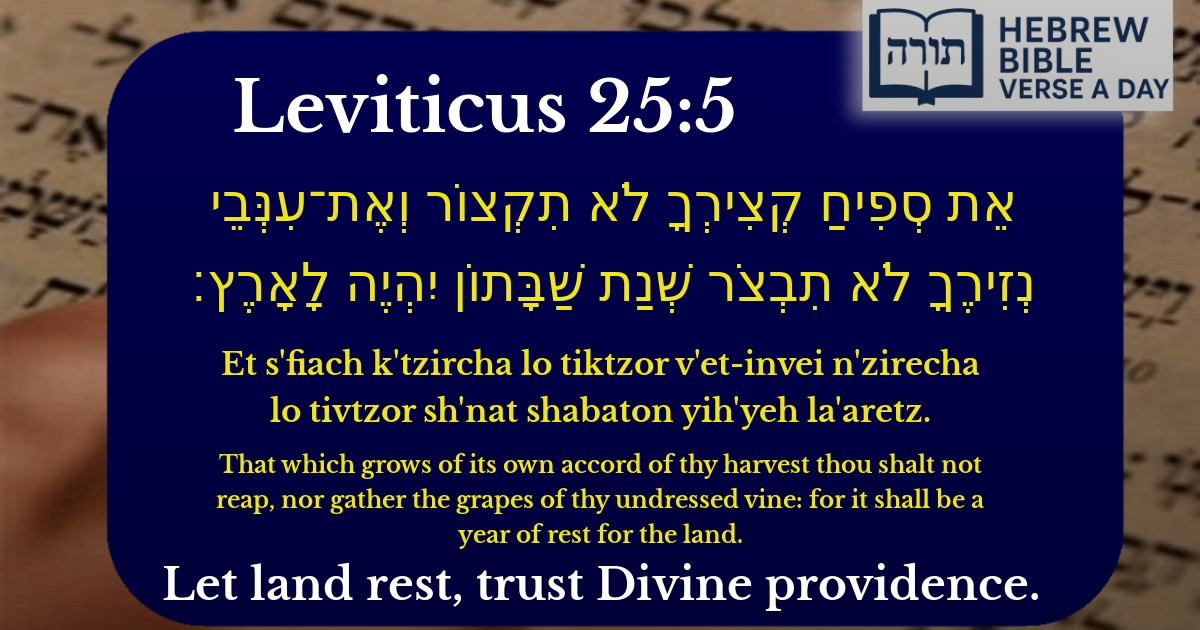Join Our Newsletter To Be Informed When New Videos Are Posted
Join the thousands of fellow Studends who rely on our videos to learn how to read the bible in Hebrew for free!
Hebrew Text
אֵת סְפִיחַ קְצִירְךָ לֹא תִקְצוֹר וְאֶת־עִנְּבֵי נְזִירֶךָ לֹא תִבְצֹר שְׁנַת שַׁבָּתוֹן יִהְיֶה לָאָרֶץ׃
English Translation
That which grows of its own accord of thy harvest thou shalt not reap, nor gather the grapes of thy undressed vine: for it shall be a year of rest for the land.
Transliteration
Et s'fiach k'tzircha lo tiktzor v'et-invei n'zirecha lo tivtzor sh'nat shabaton yih'yeh la'aretz.
Hebrew Leining Text
אֵ֣ת סְפִ֤יחַ קְצִֽירְךָ֙ לֹ֣א תִקְצ֔וֹר וְאֶת־עִנְּבֵ֥י נְזִירֶ֖ךָ לֹ֣א תִבְצֹ֑ר שְׁנַ֥ת שַׁבָּת֖וֹן יִהְיֶ֥ה לָאָֽרֶץ׃
אֵ֣ת סְפִ֤יחַ קְצִֽירְךָ֙ לֹ֣א תִקְצ֔וֹר וְאֶת־עִנְּבֵ֥י נְזִירֶ֖ךָ לֹ֣א תִבְצֹ֑ר שְׁנַ֥ת שַׁבָּת֖וֹן יִהְיֶ֥ה לָאָֽרֶץ׃
🎵 Listen to leining
Parasha Commentary
📚 Talmud Citations
This verse is quoted in the Talmud.
📖 Moed Katan 2b
The verse is referenced in the discussion about the laws of the Sabbatical year (Shemittah) and the prohibition of working the land during that year.
📖 Sanhedrin 26a
The verse is cited in the context of discussing the obligations and prohibitions during the Sabbatical year, emphasizing the sanctity of the land's rest.


Overview of the Verse
The verse (Vayikra 25:5) discusses the laws of Shemittah (the Sabbatical year), during which the land of Israel must lie fallow. It prohibits harvesting crops that grow on their own (ספיח קצירך) and gathering grapes from untended vines (ענבי נזירך). The Torah emphasizes that this year is a שבתון—a complete rest for the land.
Explanation of Key Terms
Halachic Implications
According to the Rambam (Hilchot Shemittah v’Yovel 1:1-2), the prohibition against harvesting and gathering during Shemittah applies to all agricultural work, reinforcing the idea that the land must rest just as the Jewish people observe Shabbat. The Sefer HaChinuch (Mitzvah 84) explains that this mitzvah cultivates trust in Hashem, as farmers must rely on divine providence for sustenance.
Spiritual Significance
The Midrash (Vayikra Rabbah 1:1) compares Shemittah to Shabbat, teaching that just as Shabbat sanctifies time, Shemittah sanctifies the land. The Kli Yakar emphasizes that this rest period reminds us that the land ultimately belongs to Hashem, not to human owners. By refraining from agricultural labor, we acknowledge divine sovereignty over Eretz Yisrael.